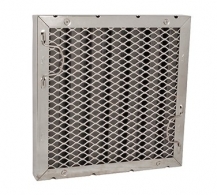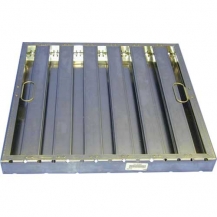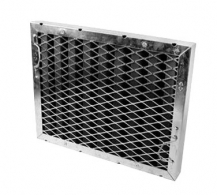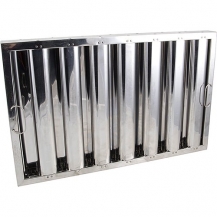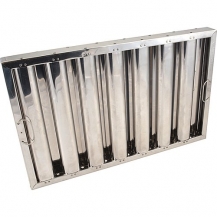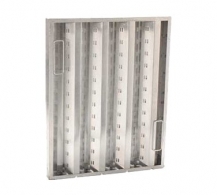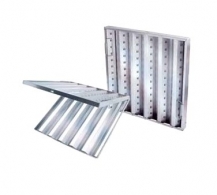Exhaust Hood Filters
-
-
Special Price $113.00 $120.87
-
Special Price $132.78 $165.82
-
-
Special Price $156.00 $188.14
-
-
Special Price $153.43 $190.50
Exhaust Hood Filters For Your Commercial Kitchen Hoods
Exhaust hood filters, also known as grease filters, are the crux of the ventilation systems in a commercial kitchen. The primary purpose of the restaurant hoods is to remove grease-laden vapors and keep your kitchen clean, free from foul odors, safe against fire hazards. It is the exhaust hood filters that carry out this critical task. They catch the grease in the smoke generated by the cooking equipment, filter it from the smoke, and funnel it into the grease trap. Fire and health codes require installing commercial kitchen hoods with vent hood filters for grills, broilers, fryers, or other cooking operations involving oil, fat, or grease.
Why Need Exhaust Hood Filters?
Exhaust hood filters are required components of restaurant ventilation. Food safety and fire prevention are among the top priorities in many local and national guidelines regulating food service establishments. Failure to filter the grease from the smoke means dirty moisture dripping on food, paving the way for food contamination. Plus, the grease piled up on surfaces is an open invitation to fires, as it can be highly flammable over time.
Exhaust hood filters are also an integral part of proper ventilation. Fire isn't the only risk in a commercial kitchen. Cooking, washing, and all the hustle in a restaurant kitchen lead to indoor air pollution. Without hood filters, the debris collected in the air would make its way into the ductwork. Dirt particles lingering in the air ducts can reduce ventilation efficiency and shorten the life of your hoods. When expelled out, they contaminate the environment. Other possible results are excess heat and smoky air in the kitchen. All these will add strain on your ventilation system, causing an increase in utility costs.
How To Choose The Right Exhaust Hood Filter?
Exhaust hood filters are constructed of three different materials. Aluminum hood filters feature a shiny look and cost less. However, they are more prone to corrosion, so they need replacing more often. Galvanized hood filters aren't so aesthetical but can last longer than aluminum. Although they are pricier than the other two materials, stainless steel hood filters combine the benefits of sleek appearance and durability. They are also the most effective at catching grease and pollutants in the air. When specifying the material, you need to consider how the hood filter will complete your kitchen's general outline and daily cooking volume.
Sizing your exhaust hood filter is the next step. The number and size of your cooking equipment and the amount and frequency of cooking are crucial factors deciding what size range hood filter you need. If you are replacing the filters of your existing hoods, make sure to match the dimensions of your hood opening with the hood filter sizes specified by the manufacturer.
Exhaust hood filters need regular cleaning and replacing, so it is crucial to learn how to clean range hood filters. Dirty filters cannot trap the airborne grease and debris, resulting in serious fire prevention, food safety, cleanliness, and ecosystem issues. You can browse hood filters of various sizes and materials at Chef's Deal to keep your kitchen up to code, safe, and fresh.

